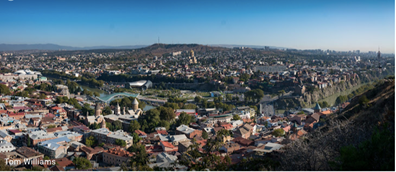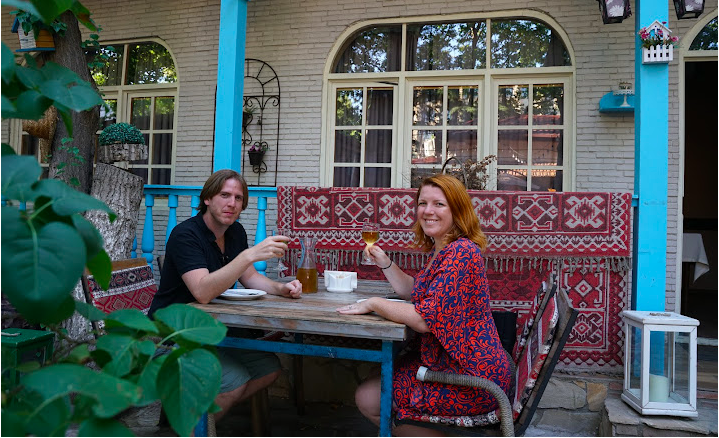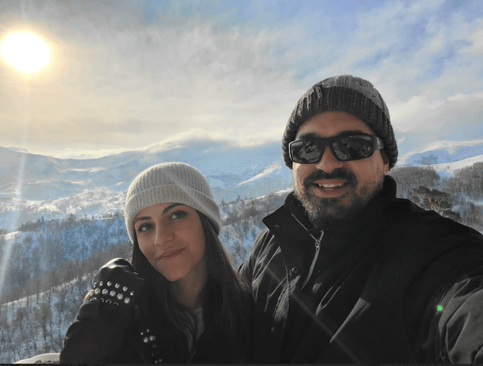You’re trekking along a path below the snow-capped Caucasus Mountains.
In the afternoon, you grab your mountain bike, hit a few more trails, and then sip coffee outside a café.
 Hiking in Georgia: Royalty-Free Courtesy of Pixabay
Hiking in Georgia: Royalty-Free Courtesy of Pixabay
The cafés and restaurants offer a relaxed, European vibe. The wine-making culture is the oldest in the world.
Best of all, this country could be lighter on your wallet than anywhere you’ve been.
This is Georgia…one of the world’s best-kept secrets.
Home to about 4 million people, Georgia shares latitudes with Barcelona, Spain, at roughly 41 degrees north of the equator.
Northern Turkey borders Georgia to the south. The Black Sea’s resorts and beaches make up the border to the west. Georgia is just over half the size of England. But it boasts seven ski resorts.
The rich culture, vibrant youth, flexible visa programs and enticing tax schemes make it a magnet for expat retirees, new businesses and digital nomads.
 Tbilisi, Georgia: photo courtesy of Tom Williams
Tbilisi, Georgia: photo courtesy of Tom Williams
If you were tempted to move to Georgia, you would have plenty of time to peer under the hood and thoroughly kick the tires. Most people can stay for a year without a residency permit. It’s the ultimate test drive.
Forty-one-year-old Brit, Tom Williams and his 39-year-old Australian wife, Meg, moved to Tbilisi, Georgia in 2019. “We were digital nomads from 2013 to 2019," says Tom. “We were visiting 4 to 12 countries per year. Some other friends [who were also digital nomads] suggested we would love Georgia because of its diverse selection of cheese and wine.”

Tom and Meg Williams in Tbilisi: photo courtesy of Tom Williams
Tom and Meg first tested the country during a six-week stay. The great food, local hospitality and geographic diversity convinced them to curtail global wandering and become residents. “Georgia has almost every climate zone (aside from desert and tropics),” says Tom. “There are high mountains and glaciers, fertile valleys, sub-tropical zones, arid areas.” Wanting to share the country’s epicurean delights, Tom and Meg opened their own shop and run excursions at Eat This Tours.
Tom says COVID-19 and the war in Ukraine initially flexed the biceps of inflation. But if you retire in Georgia, your portfolio’s buying power would perform like a Marvel hero. It costs far less to live in Georgia than it does in Canada, the United States, Australia, New Zealand and Western Europe.
According to Numbeo.com, Georgia is cheaper than Portugal. It’s cheaper than Spain. It’s cheaper than Panama. And the tax scheme draws digital nomads and retirees like heroes to a Justice League.
PB Services tax specialist, Rati Abashmadze says, “According to the tax code…any gains from selling non-Georgian ETFs [or index funds] is tax-free.” That means most nationalities could move to Georgia, withdraw regular sums from their portfolio, and legally stiff the taxman. And when digital nomads earn money from non-Georgian sources that money isn’t taxed.
Thirty-three-year-old American, Jeff Brown, and his 25-year-old Georgian wife, Nino Chagunava, started CapitalB, a real estate business in Georgia. “For entrepreneurs, the country offers an enticing flat income tax rate of 1%,” explains Jeff. “This is a game-changer, particularly for those looking to start businesses, invest, and thrive in a business-friendly atmosphere.”

Jeff Brown and Nino Chagunava: photo courtesy of Jeff Brown
But Jeff didn’t move to Georgia because of the low taxes. “Tbilisi has this unique ability to make you feel like you've stepped into a storybook,” he says, “where every winding street tells tales of the past. The decision to settle here was more about the heart than any strategic move.”
And medical costs are low. When Meg Williams became pregnant, she and Tom didn’t have medical insurance. But they chose a level of care and service that might make Midas blush.
“We had a private room at one of Tbilisi’s top maternity hospitals for four days,” recalls Tom. “We paid for a midwife, a doula, a doctor, some post-care and medicine. The total cost came to less than $1,500 USD.”
Fifty-nine-year-old Lesley Koch and her 71-year-old husband, Chris, moved from South Africa to Georgia to retire. They live about 10 kilometres from the city of Batumi, on the Black Sea. Their combined local medical insurance costs less than $100 USD per month.
If they have any tests or procedures that aren’t covered by their insurance, it can cost less than a bag of groceries in England or Dubai.
“At one time, Chris had a severe headache,” recalls Lesley. “I panicked and thought he might have a stroke or encephalitis. I took him to the hospital where they took a CT Scan and he was under observation for about 6 hours. The CT Scan cost about $90 USD.”
Dental services are also cheap. “Chris had a toothache and I had two cavities re-done,” says Lesley. “Chris’ bill came to about $6, including x-rays, and mine, which also included x-rays, cost about $20 USD. We both were impressed and received good treatment—very professional, ultra-modern, clean and efficient and very informative options and advice.”
What makes Georgia stand out from several low-cost countries, however, is the low crime rate. And according to the World Bank’s data on intentional homicides, it’s as safe as Canada.
So what’s not to like?
English is widely spoken. But the local language can be tricky, and it has a different alphabet. The Lonely Planet’s Digital Nomad Handbook also says that, among the favourite global cities for digital nomads, Tbilisi is the only one that isn’t LGBT-friendly.
But the country is changing. The economy and the culture are expanding with an entrepreneurial, social flair.
Georgia is both a haven for the rich and a secret Nirvana for retirees on a budget.
Andrew Hallam is the best-selling author of Millionaire Expat (3rd edition), Balance, and Millionaire Teacher.

